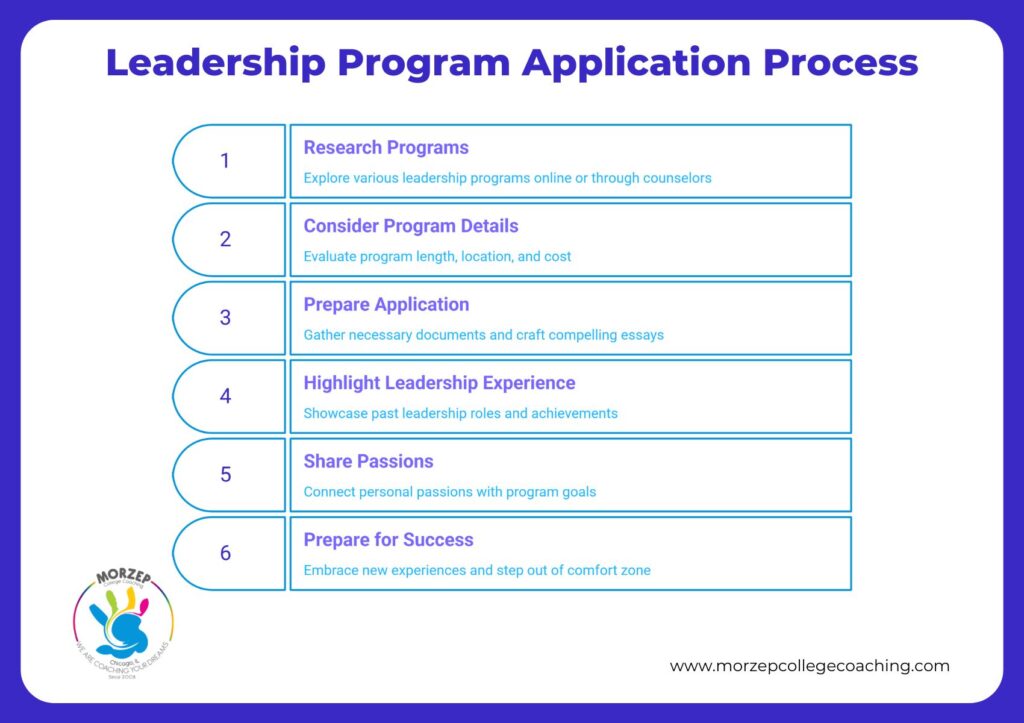Leadership programs for high school students offer an incredible opportunity to develop essential leadership skills beyond the classroom. These programs help students grow personally and academically, preparing them for future career paths and making a positive impact in their communities.
What should young leaders know about these programs and joining each one? This guide will outline essentials like:
- What leadership programs for high school students involve
- What to expect from leadership development programs
- How to get started and maximize your experience with a leadership summit
- The importance of experiential learning for high school students
Speak with a college coach today!
Speak with an expert college coach and learn if working with one is right for your academic journey. Free 15-minute consultation, no cost, no obligations.
What Are Student Leadership Programs
Leadership programs for high school students are designed to help students develop essential leadership skills. They focus on building abilities like communication, problem-solving, teamwork, decision-making, and public speaking. They also provide hands-on experience through activities such as field trips, community service projects, and service learning opportunities.
There is a wide variety of high school leadership programs available, ranging from school-led initiatives to community-based programs and even immersive summer camps for juniors and seniors. Some examples include the Boston Leadership Institute, the Bank of America Student Leaders Program, and the Leadership Training Institute.
Exploring the Types of Leadership in School
Leadership within a high school setting manifests in two main forms: formal and informal.
Formal Leadership
This type involves official positions where you’re recognized as a leader. Think roles like student council president, captain of a sports team, or the head of a major student organization. These positions come with specific responsibilities and the power to make decisions that affect others.
Informal Leadership
Often overlooked, informal leadership doesn’t come with a title. It happens when you take the initiative in less structured settings. For example, you might be a project leader in a group assignment.
Research by the Association for Supervision and Curriculum Development suggests that students who engage in informal leadership roles are excellent at critical thinking and emotional intelligence, key components of effective communication and interpersonal relationships.
Why is leadership important for high school students?
Leadership helps high school students find their voice, build confidence, and learn how to work with others. It teaches real-life skills like responsibility, communication, and decision-making that stick with them long after graduation.
What to Expect from Leadership Opportunities for High Schoolers
Leadership programs for high school students are a fantastic way for teens to grow personally and develop skills that will help them in their future careers and beyond. Some of the biggest perks of a quality youth leadership seminar include:
Personal Development
High school leadership programs focus on building self-confidence and emotional intelligence. Students can expect to strengthen their active listening and empathy skills, which are crucial for effective leadership.
Building Key Leadership Skills
Leadership programs help students develop conflict resolution, time management, and collaboration skills. Through a variety of activities, students learn how to lead by example, inspire others, and manage projects efficiently.
Opportunities to Lead in Real-World Scenarios
Students will gain hands-on experience by leading community service projects, organizing school events, and participating in public speaking opportunities. These real-world scenarios allow students to apply the leadership skills they’ve learned in a meaningful way.
Networking and Mentorship
Leadership programs also provide career opportunities and allow students to connect with peers, mentors, and even industry leaders. Networking with professionals can be a great way to gain insights and guidance for future leadership goals.
How to Get Started with Leadership Opportunities for Students
Getting involved in leadership programs for high school students is an exciting step toward building valuable skills for the future. Here’s how to get started and make the most of these leadership opportunities.

Research Different Programs
Start by exploring a wide variety of leadership programs online or through your school counselor. Be sure to consider:
- Program length: Is it a summer program or a year-long commitment?
- Location: Would you prefer a local program, like the Boys and Girls Clubs of America, or something on a college campus?
- Cost: Look for scholarships or programs like the Bank of America Student Leaders Program that may offer financial aid.
Application Process
Most high school leadership programs have an application process that may include an online application, essays, recommendations, and sometimes interviews. To make your application stand out:
- Highlight any demonstrated leadership experience, like leading a community service project.
- Share your passions and how the program aligns with your academic and professional goals.
Prepare for Success
Once accepted, it’s time to get ready! Prepare yourself both mentally and emotionally by:
- Embracing new experiences and challenges.
- Stepping out of your comfort zone to build critical thinking and problem-solving skills.
What are some leadership programs for high school students?
Leadership activities for high school students include leading or starting a club, serving in student government, organizing a community service project, mentoring younger students, captaining a sports team, or taking initiative in group projects at school.
Leadership Programs for High School Students That Stand Out
If you’re ready to take the leap and build valuable leadership skills, there are a wide variety of leadership programs for students that offer incredible learning experiences.
Boston Leadership Institute
Known for its selective programs, this institute offers students the chance to dive deep into subjects like STEM while developing critical thinking and leadership ability. This program combines hands-on academic learning with leadership development, giving students a chance to explore future career paths while building essential leadership skills.
Bank of America Student Leaders Program
Focused on high-achieving students, this program emphasizes service learning and community service projects. It’s an excellent opportunity for students to gain hands-on experience while working with nonprofits like the Boys and Girls Clubs of America and Habitat for Humanity. The program highlights social responsibility and provides a positive impact on the community.
Youth Leadership Academy
This program focuses on building effective leadership through workshops and real-world challenges. Students will participate in activities such as public speaking, conflict resolution, and team-building exercises, all designed to strengthen leadership styles and prepare students for leadership roles in their schools and communities.
West Point Summer Leadership Experience
For students interested in military or public service careers, this immersive program on the historic campus of West Point offers leadership lessons combined with physical and mental challenges. It’s an intense but rewarding experience that fosters emotional intelligence, teamwork, and leadership in action.

Why High School Leadership Programs Are a Game-Changer for College Applications
Participating in leadership programs for high school students can give your college application the edge it needs to stand out. Colleges are always on the lookout for students who show initiative, take on responsibility, and can work effectively with others. Involvement in a high school leadership program demonstrates these qualities and more, making it a key factor in boosting your chances of admission.
Qualities Colleges Look For
When reviewing applications, admissions officers look for students who have leadership experience because it shows:
- Initiative: Taking the lead in a community service project or school leadership program highlights your ability to step up and take charge.
- Responsibility: Whether managing teamwork during a project or making important decisions, leadership experience shows that you’re responsible and reliable.
- Collaboration: Leadership programs provide the chance to work with diverse groups, building the essential leadership skills colleges value, such as conflict resolution, critical thinking, and public speaking.
Are there scholarships or financial aid available for leadership programs?
Yes, many leadership programs offer scholarships, grants, or sliding-scale fees to make participation more accessible. It’s always worth asking because support is often available, even if it’s not advertised.
Building Leadership Skills in Students: Additional Opportunities
Now that we know what leadership skills set students apart, let’s focus on the ways to develop and grow them:
Join Clubs and Organizations
Engaging in school clubs, sports teams, and community groups offers prime opportunities to practice leadership. Taking on roles such as team captain or club president builds your leadership skills and ability to work with and lead a team towards common goals.
Volunteering Opportunities
Leading community service projects can greatly enhance your leadership qualities. Young people who volunteer regularly have a higher likelihood of achieving leadership success in their adult lives due to the early practice in handling real-life challenges.
Part-Time Jobs or Internships
Working part-time or completing internships allows students to gain practical, real-world experience. These roles often require quick decision-making, effective communication, and problem-solving, all of which are essential components of effective leadership.
School Projects and Presentations
Leading group projects and presentations is a direct method to exercise leadership skills within the educational setting. These activities demand goal setting, active listening, and the delegation of tasks—skills that are crucial for any effective leader.
Unlock Your Leadership Potential and Ace Your College Applications
At Morzep College Coaching, we understand that leadership programs for high school students do more than just teach leadership skills; they prepare students for a bright future, offering competitive advantage during the college application process.
As your trusted partner in the application process, we’re here to help you, guide you through the process, help you pick the best pre-college programs, and ace the national student leadership conference application process.
Ready to make your college dreams a reality? Book a consultation with Morzep College Coaching today, and let us guide you through the journey to college success. We’re here to help you build a future that’s as bright as your leadership potential!





